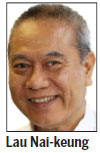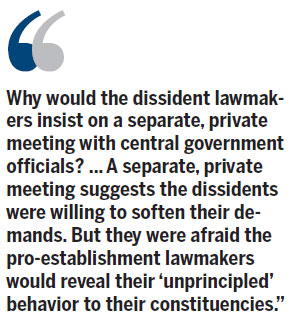Trip to Shanghai was a considerable achievement
Updated: 2014-04-15 07:14
By Lau Nai-keung(HK Edition)
|
|||||||

A discussion without any guidance is not necessarily a productive experience. When our lawmakers realize that future political reform in Hong Kong must always follow the Basic Law, they can then focus on what is permissible and ignore what is not. This set the tone for genuine dialogue between them and central government officials in Shanghai. Our legislative councilors had an opportunity in Shanghai to hold discussions in accordance with the Basic Law - an opportunity they should have used well.
To begin with, there were the usual dramas. Shortly after the Hong Kong lawmakers arrived at Shanghai's Pudong International Airport, customs officers searched Leung Kwok-hung's luggage. They then asked him to surrender some illegal items he was carrying. Leung refused and ended the trip, returning to Hong Kong with two other dissidents, the Labour Party's Cyd Ho and Peter Cheung.
The meeting with central government officials started with a small gift-giving ceremony. Dissident lawmaker Frederick Fung gave Director of the State Council's Hong Kong and Macao Affairs Office Wang Guangya a box containing three tracks. That was to symbolize the Alliance for True Democracy's demand that the public, political parties and the Nominating Committee should all put forward candidates. The box was wrapped in a copy of the Basic Law.
Wang responded with a clever remark about the need for experts to differentiate between "genuine" and "counterfeit" antiques. "Now I am giving legislator Fung the genuine Basic Law," he said as he handed over his gift.
An hour into the meeting between the lawmakers and Li Fei, Wang Guangya and Zhang Xiaoming, pro-establishment lawmakers (except Legislative Council Chairman Tsang Yok-sing) all left. This gave the dissident lawmakers some private time with central government officials.
After the meeting, the dissident lawmakers told the press they were disappointed. They said little had been achieved over their deep-seated differences. These include whether the public should have a role in nominating candidates for the 2017 Chief Executive election, or whether the electoral system should ensure the top job goes to a "patriot". Tsang Yok-sing admitted "much distance" still remained on some issues.

Despite these reservations, the Shanghai trip was obviously a considerable achievement.
Most analysis on the trip has missed the obvious. Why would the dissident lawmakers insist on a separate, private meeting with central government officials?
If their comments were the old ones, of "true universal suffrage", "no screening" and "civic nomination", then surely a public meeting would suffice? In terms of publicity, they would certainly want more people to witness how they "confronted" central government officials. A separate, private meeting suggests the dissidents were willing to soften their demands. But they were afraid the pro-establishment lawmakers would reveal their "unprincipled" behavior to their constituencies.
The premature departure of Leung Kwok-hung and other radicals was another sign they had decided not to give Beijing officials a hard time. Even if Leung Kwok-hung had surrendered the illegal objects he was carrying, there were still ways he could have created embarrassment during the meeting. If the radicals had disrupted the meeting this would have been worse than the incident at the airport.
At the same time, if the radicals were present at the private meeting between the dissidents and Beijing officials, the moderates could not have conveyed a friendly message. If a compromise had been reached during the meeting, the radicals would not want any part of it.
The real question is why Leung decided not to join the meeting. I believe it has something to do with US Vice-President Joe Biden's meeting with Anson Chan and Martin Lee. This showed that Chan's political reform proposal has US support. As it does not insist on "civic nomination", Chan's proposal is more moderate than those of the more radical lawmakers. So if Leung backed down because of the Biden meeting it is clear who the real boss is.
The author is a veteran current affairs commentator.
(HK Edition 04/15/2014 page9)